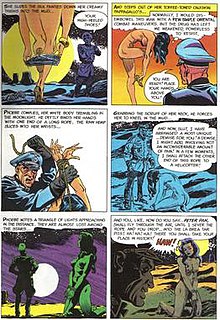 W
W"The Adventures of Phoebe Zeit-Geist" was an American comics series, written by Michael O'Donoghue and drawn by Frank Springer. From January 1965, it was serialized in the magazine Evergreen Review, and later published in book form as a Grove Press hardcover in 1968 and trade paperback in 1969. It was reissued as a trade paperback in 1986.
 W
W"The Angel of the Odd" is a satirical short story by Edgar Allan Poe, first published in 1844 in The Columbian Lady's and Gentleman's Magazine.
 W
WAşk-ı Memnu is a Turkish romance novel by Halit Ziya Uşaklıgil. It was serialized in 1899 and 1900 in Servet-i Fünun, a leading Turkish literary magazine of the time.
 W
W"The Aviator" is the 1965 English translation of a short story, L'Aviateur, by the French aristocrat writer, poet and pioneering aviator, Antoine de Saint-Exupéry.
 W
W"The Bells" is a heavily onomatopoeic poem by Edgar Allan Poe which was not published until after his death in 1849. It is perhaps best known for the diacopic use of the word "bells." The poem has four parts to it; each part becomes darker and darker as the poem progresses from "the jingling and the tinkling" of the bells in part 1 to the "moaning and the groaning" of the bells in part 4.
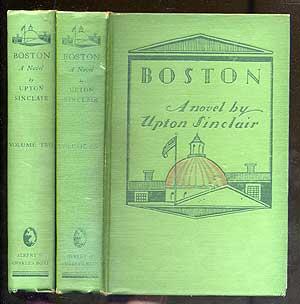 W
WBoston is a novel by Upton Sinclair. It is a "documentary novel" that combines the facts of the case with journalistic depictions of actual participants and fictional characters and events. Sinclair indicted the American system of justice by setting his characters in the context of the prosecution and execution of Sacco and Vanzetti.
 W
WChildhood Memories is one of the main literary contributions of Romanian author Ion Creangă. The largest of his two works in the memoir genre, it includes some of the most recognizable samples of first-person narratives in Romanian literature, and is considered by critics to be Creangă's masterpiece. Structured into separate chapters written over several years, it was partly read in front of the Junimea literary club in Iași. While three of the total four section were published in Creangă's lifetime by the Junimea magazine Convorbiri Literare, the final part was left incomplete by the writer's death.
 W
WConversations with Professor Y is a 1955 novel by the French writer Louis-Ferdinand Céline. The narrative focuses on discussions about literature between an author and an academic. The first two thirds of the novel were published in Nouvelle Revue Française in 1954, and the finished work through Éditions Gallimard the following year.
 W
WUn début dans la vie is a novel by the French writer Honoré de Balzac. It is the sixth of the Scènes de la vie privée in La Comédie humaine.
 W
WDespair is the seventh novel by Vladimir Nabokov, originally published in Russian, serially in the politicized literary journal Sovremennye zapiski during 1934. It was then published as a book in 1936, and translated to English by the author in 1937. Most copies of the 1937 English edition were destroyed by German bombs during World War II; only a few copies remain. Nabokov published a second English translation in 1965; this is now the only English translation in print.
 W
WDoina, or Doină, is a political poem by the Romanian Mihai Eminescu. It was first published in 1883 and is therefore seen by some as Eminescu's final work in verse, although it may actually be an 1870s piece, inspired or enhanced by the perceived injustice of the Berlin Treaty. A variation of the doina, picked up from Romanian folklore, it is noticeably angry to the point of rhetorical violence, a radical expression of Romanian nationalism against invading "foreigners", noted for its hints of ecopoetry and "anti-technicist" discourse. Doina delineates the ideal geographical space of Greater Romania, at a time when Romanian-inhabited regions were divided between an independent kingdom and multinational empires. Its final lines call on Stephen the Great, depicted as a sleeping hero, to take up the cause of Romanians and chase foreigners out with the sound of his horn. The same basic themes appear in another poem by Eminescu, the anthem-like La arme, which is sometimes discussed as a variant of Doina.
 W
WAn Eye for an Eye is a novel by Anthony Trollope written between 13 September and 10 October 1870, but held back from publication until August 1878 when serialization began in the Whitehall Review. Publication in the form of a two volume novel was timed to coincide with the issue of the final serialized episodes in January 1879.
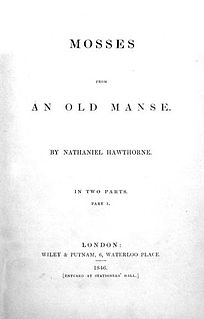 W
W"Hawthorne and His Mosses" (1850) is an essay and critical review by Herman Melville of the short story collection Mosses from an Old Manse written by Nathaniel Hawthorne in 1846. Published pseudonymously by "a Virginian spending July in Vermont", it appeared in The Literary World magazine in two issues: August 17 and August 24, 1850. It has been called the "most famous literary manifesto of the American nineteenth century."
 W
WKir Ianulea or Kyr Ianulea is a fantasy and historical fiction novella or short story, published by Romanian author Ion Luca Caragiale in 1909. Borrowing the elements of a fairy tale, satire and frame story, it has become recognized as one of Caragiale's leading contributions to short prose, and is often described as one of the seminal works written by him during the last decade of his life. While its narrative structure is largely based on Belfagor arcidiavolo, a story by 16th century writer and political thinker Niccolò Machiavelli, Kir Ianulea employs additional elements such as anecdotes to evolve into a social fresco of late 18th-century Wallachia and the Ottoman-ruled Balkans as a whole. Caragiale primarily adapts Machiavelli's theme, which is a fable about the innate unreliability of women, to the realities of the Phanariote epoch, focusing his attention on the interactions between Greeks and Romanians while offering additional insight into the process of acculturation.
 W
WThe Lay of Aotrou and Itroun is a poem of 508 lines, written by J. R. R. Tolkien in 1930 and published in Welsh Review in December 1945.
 W
WLight House: A Trifle, a 2000 satirical novel by American screenwriter William Monahan. Originally serialized in the Amherst literary magazine Old Crow Review from 1993 to 1995, Monahan sold Light House to Riverhead Books, a Penguin Group imprint, in 1998. Warner Bros. optioned the film rights while the novel was in manuscript and hired Monahan to write the screenplay adaptation. The novel was delayed for two years, with plans to release it alongside the upcoming film; however, the film was never produced.
 W
WThe Miser's Daughter is a novel by William Harrison Ainsworth serially published in 1842. It is a historical romance that describes a young man pursuing the daughter of a miserly rich man during the 18th century.
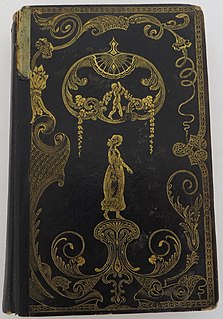 W
W"Morning on the Wissahiccon" is an 1844 work by Edgar Allan Poe describing the natural beauty of Wissahickon Creek, which flows into the Schuylkill River in Philadelphia. It borders between being a short story and a travel essay.
 W
W"MS. Found in a Bottle" is an 1833 short story by American writer Edgar Allan Poe. The plot follows an unnamed narrator at sea who finds himself in a series of harrowing circumstances. As he nears his own disastrous death while his ship drives ever southward, he writes an "MS.", or manuscript, telling of his adventures which he casts into the sea. Some critics believe the story was meant as a satire of typical sea tales.
 W
W"Nothing Gold Can Stay" is a short poem by Robert Frost, written in 1923 and published in The Yale Review in October of that year.
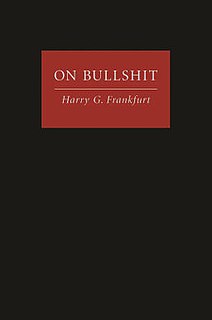 W
WOn Bullshit is a 2005 book by American philosopher Harry G. Frankfurt which presents a theory of bullshit that defines the concept and analyzes the applications of bullshit in the context of communication. Frankfurt determines that bullshit is speech intended to persuade without regard for truth. The liar cares about the truth and attempts to hide it; the bullshitter doesn't care if what he or she says is true or false, but cares only whether the listener is persuaded. Frankfurt's philosophical analysis of bullshit has been analyzed, criticized and adopted by academics since its publication.
 W
WPages Stained With Blood (2001) originally published as Tej Aru Dhulire Dhushorito Prishtha is an Assamese novel by Indira Goswami that depicts the gory Sikh pogrom in Delhi as an aftermath of the assassination of the Indian Prime Minister Indira Gandhi in June 1984. First published in Assamese in Goriyoshi literary journal in episodic form, it generated controversy in conservative Assam due to the love story between a professor and a riksha puller.
 W
WA Pair of Blue Eyes is a novel by Thomas Hardy, published in 1873, first serialised between September 1872 and July 1873. It was Hardy's third published novel, and the first not published anonymously upon its first publication. Hardy included it with his "romances and fantasies".
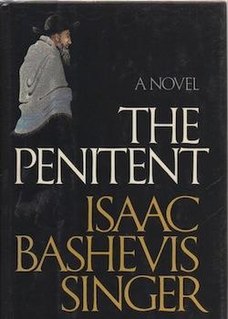 W
WThe Penitent (1983) is a novel by Isaac Bashevis Singer (1902–1991). It was originally published in installments in The Jewish Daily Forward (1973) with the Yiddish title of Der Baal Tshuve. The English translation was made by Joseph Singer for Farrar Straus & Giroux. It tells the story of Joseph Shapiro, emigrating from Poland in 1939 and from USSR in 1945 to the United States in 1947, where he becomes rich and involved with consumism and lust, so that he decides to leave everything, including his job, his wife and his lover, and finally expatriate to Israel, where he wonders about the traditional values of Jewish culture.
 W
WPhineas Finn is a novel by Anthony Trollope and the name of its leading character. The novel was first published as a monthly serial from October 1867 to May 1868 in St Paul's Magazine. It is the second of the "Palliser" series of novels. Its sequel, Phineas Redux, is the fourth novel in the series. The character of Phineas Finn is said to have been partly inspired by Sir John Pope Hennessy, a Roman Catholic from Cork, who was elected as an "Irish Nationalist Conservative" Member of Parliament for King's County in 1859.
 W
WPoor Dionis or Poor Dionysus is an 1872 prose work by Romanian poet Mihai Eminescu, classified by scholars as either a novel, a novella or a modern fairy tale. It is a liberal interpretation of contemporary German philosophy and ancient motifs, discussing themes such as time travel and reincarnation through the lens of post-Kantian idealism. Its eponymous central character, a daydreaming scholar, moves between selves over time and space, between his miserable home, his earlier existence as a monk in 15th-century Moldavia, and his higher-level existence as a celestial Zoroaster.
 W
WThe psychiatrist Irabu series (精神科医・伊良部シリーズ) is a series of short stories by the Japanese writer Hideo Okuda which features the fictional psychiatrist Dr. Ichirō Irabu .
 W
W"The Purloined Letter" is a short story by American author Edgar Allan Poe. It is the third of his three detective stories featuring the fictional C. Auguste Dupin, the other two being "The Murders in the Rue Morgue" and "The Mystery of Marie Rogêt". These stories are considered to be important early forerunners of the modern detective story. It first appeared in the literary annual The Gift for 1845 (1844) and soon was reprinted in numerous journals and newspapers.
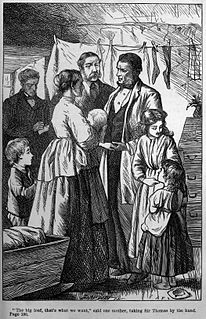 W
WRalph the Heir is a novel by Anthony Trollope, originally published in 1871. Although Trollope described it as "one of the worst novels I have written", it was well received by contemporary critics. More recently, readers have found it noteworthy for its account of a corrupt Parliamentary election, an account based closely on Trollope's own experience as a candidate.
 W
WResurrection, first published in 1899, was the last novel written by Leo Tolstoy. The book is the last of his major long fiction works published in his lifetime. Tolstoy intended the novel as a panoramic view of Russia at the end of the 19th century from the highest to the lowest levels of society and an exposition of the injustice of man-made laws and the hypocrisy of the institutionalized church. The novel also explores the economic philosophy of Georgism, of which Tolstoy had become a very strong advocate towards the end of his life, and explains the theory in detail.
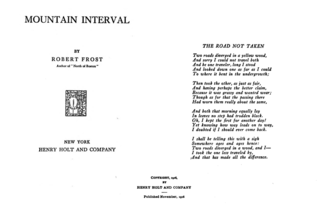 W
W"The Road Not Taken" is a narrative poem by Robert Frost, first published in the August 1915 issue of The Atlantic Monthly, and later published as the first poem in the collection Mountain Interval (1916). Its central theme is the divergence of paths, both literally and figuratively, although its interpretation is noted for being complex and potentially divergent.
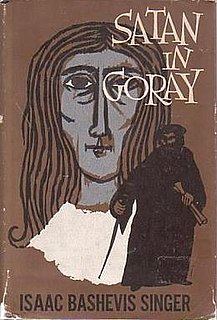 W
WSatan in Goray (1955) is a novel by Isaac Bashevis Singer (1903–1991). It was originally published between January and September 1933 in installments in a literary magazine called Globus and was Singer's first published work. The English translation was made by Jacob Sloan with the author's help. It is set in the years following 1648, when the Chmelnicki massacres, considered one of the greatest Jewish catastrophes, occurred. The story describes the Jewish messianic cult that arose in the village of Goraj and the effects of the 17th century faraway false messiah Shabbatai Zvi on the local population.
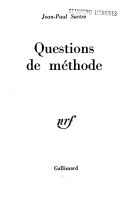 W
WSearch for a Method or The Problem of Method is a 1957 essay by the philosopher Jean-Paul Sartre, in which the author attempts to reconcile Marxism with existentialism. The first version of the essay was published in the Polish journal Twórczość; an adapted version appeared later that year in Les Temps modernes, and later served as an introduction for Sartre's Critique of Dialectical Reason. Sartre argues that existentialism and Marxism are compatible, even complementary, even though Marxism's materialism and determinism might seem to contradict the abstraction and radical freedom of existentialism.
 W
W"Shooting an Elephant" is an essay by British writer George Orwell, first published in the literary magazine New Writing in late 1936 and broadcast by the BBC Home Service on 12 October 1948.
 W
W"St. Cecilia, or the Power of Music" is a short story by the German author Heinrich von Kleist. The story was written on October 27, 1810 as a gift for daughter of his friend Adam Müller, and was first published in November 1810 in Kleist's literary journal, the Berliner Abendblätter.
 W
WDer Stechlin is a novel by Theodor Fontane written between 1895 and 1897, and first published in the literary journal Über Land und Meer. It was published in book form in 1898. It is Fontane's second longest novel, and his last novel published before he died, about a year after its publication.
 W
WStorming the Reality Studio: A Casebook of Cyberpunk and Postmodern Science Fiction, edited by Larry McCaffery, was published by Duke University Press in 1992, though most of its contents had been featured in Mississippi Review in 1988.
 W
WSun and Steel: Art, Action and Ritual Death is a book by Yukio Mishima. It is an autobiographical essay, a memoir of the author's relationship to his body. The book recounts the author's experiences with, and reflections upon, his bodybuilding and martial arts training.
 W
WThe Time Machine is a science fiction novella by H. G. Wells, published in 1895. The work is generally credited with the popularization of the concept of time travel by using a vehicle or device to travel purposely and selectively forward or backward through time. The term "time machine", coined by Wells, is now almost universally used to refer to such a vehicle or device.
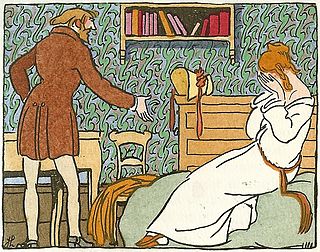 W
WScenes of Bohemian Life is a work by Henri Murger, published in 1851. Although it is commonly called a novel, it does not follow standard novel form. Rather, it is a collection of loosely related stories, all set in the Latin Quarter of Paris in the 1840s, romanticizing bohemian life in a playful way. Most of the stories were originally published individually in a local literary magazine, Le Corsaire. Many of them were semi-autobiographical, featuring characters based on actual individuals who would have been familiar to some of the magazine's readers.
 W
WThe White Guard is a novel by Mikhail Bulgakov, first published in 1925 in literary journal Rossiya. It was not reprinted in the Soviet Union until 1966.
 W
WZ. Marcas is a novelette by French author Honoré de Balzac first published in 1840. Set in contemporary Paris, it describes the rise and fall of a brilliant political strategist abandoned by the politicians he helps into power. Destitute and forgotten, he befriends a pair of students who live next door to him in a boarding-house. The story follows their many discussions about the political situation in France.